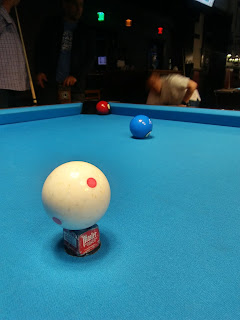"Based on Actual Events" - Memory vs. Reality in Writing
Processes are nonrigid, and resemblance to linearity is a mirage. Creative process has to alternate like electricity or cricket batters. I use input/output methods like playing the same song over and again until a painting is finished - the song builds the world and keeps the tone while I interpret what the universe has shown me. What I read is an important input to what I write, even when what I write is my own nonfictional experience.
Favourite authors sculpted my understanding of what literature should be. Ray Bradbury is at the top of that list. I met him once at a book signing in Palm Springs, California, ca. 2001. He was more adorable than I'd always suspected he was: those red suspenders and khaki shorts, comfortable shoes and trouser socks. He'd just found out that Fahrenheit 451 would be assigned reading in France, and he was so happy for his characters. They remained very real people to him, he told me. We had a great conversation before the media showed up, asking Media Questions, bidding he sit please so his knobby old-man knees were tucked away from the camera's eye.
Memories are slippery. I don't know that Ray Bradbury's suspenders were actually red; that's how I remember them, so now they are. Which is the original? Why do you need to know? As the reader, you need only to believe so that the deeper meaning of the story is acceptable. You want something onto which you can comfortably map yourself (thanks for the concept, Dr. D.R.H.)
Perception will bend your memory - you're standing somewhere different now than you were when the fact took place. You have a different set of filters than you did when you built the initial memory. This is a very interesting opportunity to discover who you are now. Be careful with the juxtaposition in your story, however - you'll probably have to choose either your current perspective or the one you think you had back then. Don't conflate them.
Memoirs need the same editorial discernment that fiction does. This week I'm reading 1Q84 by Haruki Marukami. Input.
Haruki's character Tengo is a writer; the author details Tengo's method of revising a manuscript. It's edifying in a recursive sort of way: I, a writer, am reading words a writer wrote to show his character (a writer) rewriting what's already been writ. Yes, I had to do that.
Tengo types out the story, rewrites it with pencil on paper (because each word feels different in another medium) and then types it up again. You can get a similar effect by changing the font on your digital MS.
Intent is everything. If you have to adjust colors around the raw fact of your story to make sure the pure message makes it through birth, you're good. In art, we call that Impressionism - paying more attention to movement than where the lines are drawn.
Further Reading:
Molecular Mechanisms of Memory Reconsolidation
Here's some science behind the rewriting of memories.
When Memories are Remembered They Can Be Rewritten
by Nat'l Geo. blogger Ed Yong. You will like this article.
1Q84 - Haruki Marukami
Buy the book. I'm about to read it again.
Haruki's character Tengo is a writer; the author details Tengo's method of revising a manuscript. It's edifying in a recursive sort of way: I, a writer, am reading words a writer wrote to show his character (a writer) rewriting what's already been writ. Yes, I had to do that.
Tengo types out the story, rewrites it with pencil on paper (because each word feels different in another medium) and then types it up again. You can get a similar effect by changing the font on your digital MS.
Intent is everything. If you have to adjust colors around the raw fact of your story to make sure the pure message makes it through birth, you're good. In art, we call that Impressionism - paying more attention to movement than where the lines are drawn.
Further Reading:
Molecular Mechanisms of Memory Reconsolidation
Here's some science behind the rewriting of memories.
When Memories are Remembered They Can Be Rewritten
by Nat'l Geo. blogger Ed Yong. You will like this article.
1Q84 - Haruki Marukami
Buy the book. I'm about to read it again.











:)
ReplyDelete;)
DeleteI almost met Ray Bradbury at least a dozen times. One of his daughters worked at my favorite Barnes & Noble in Thousand Oaks, and he was in and out of there all of the time, but never when I was there. And then he died. I felt a door close. :-(
ReplyDeleteWhen I was 15 my older brother gave me a copy of The Illustrated Man--a book that was an experience in itself: imaginative, completely engrossing, and with observations that stuck with me throughout my life. Seemed to me like after finding Bradbury, I wasn't alone in the universe. I discovered many other great books after that, but I would return and read his work to get that original feeling of loving stories.
ReplyDeleteAt 19, I wrote a story that get recognized, and I burned with the idea of becoming a writer. I wrote Bradbury at letter expressing my doubts (I was too old, right?) and sent it to his publishing house--and he wrote back. It was all emphatic and positive--yes, do it, he said, of course you're not too old at 19 to start! Unfortunately, at 20, life happened and I didn't another story for 40 years. At 60, I realized that itch never went away. In fact, writing still opens new worlds. Miss you, Ray. (Thanks for bringing him up, Deb).
Thank you for sharing! I love these stories. Also, I love this thing I just found: http://operawire.com/kelvin-chan-to-direct-sci-fi-opera-the-bradbury-tattoos/
ReplyDeleteMy favorite Bradbury is always "Something Wicked This Way Comes." Sometimes a lightning rod salesman knocks on your door and your life changes, never to be the same again.
ReplyDelete